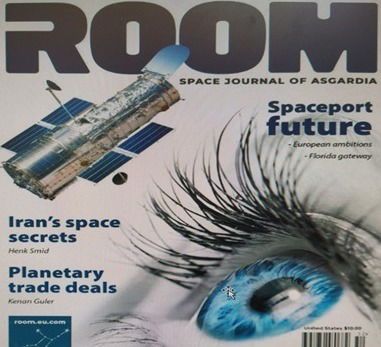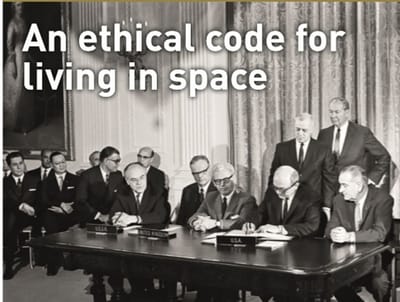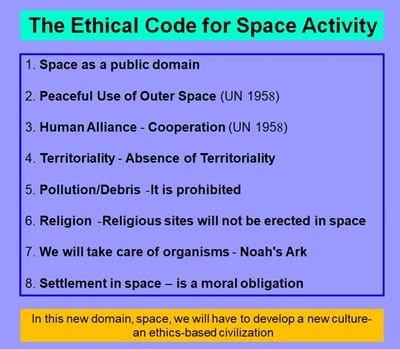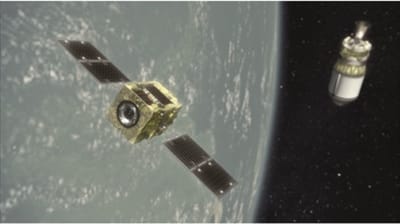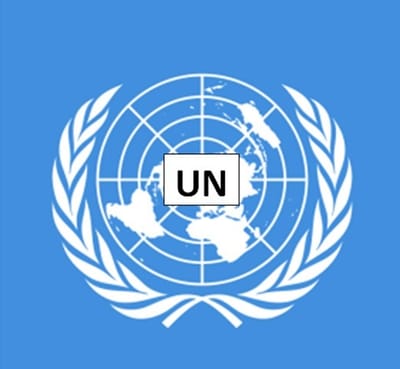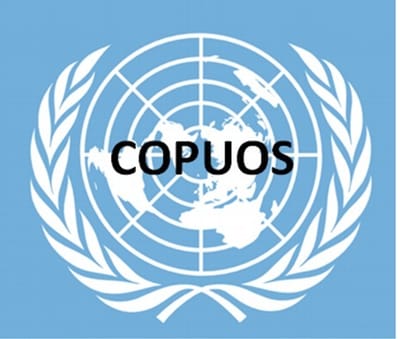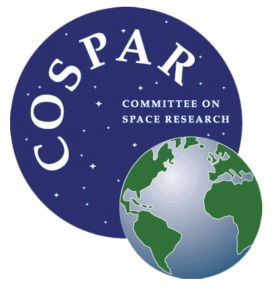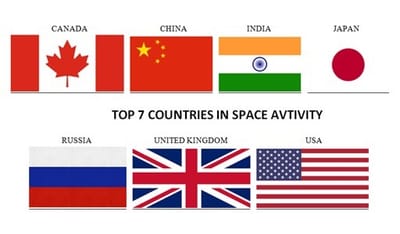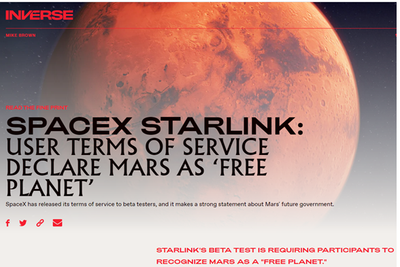The field of ethics in space has been dealt with extensively by public bodies (UN, EU, COSPAR), all of which are assisted by countries, academic institutions, economic entities and citizens. Of all these, I have not found a single document which is a comprehensive and binding ethical code for human activity in space. Therefore, I am suggesting 6 fundamental assumptions and 8 ethical codes to be discussed.
Read MoreWorld’s first comprehensive and binding ethical code for human activity in space
We will develop
an ethics-based civilization in space
This website is part of a project to integrate the “Ethical Code for Space Activity” into the UN General Assembly's resolutions.
First ethical code document for Space
History
Organizations
F.A.Q
1. Is there an ethical code for planet Earth?
The United Nations was established in 1945, and it drew up an important human rights treaty in 1948. Yet to date no "Ethical Code for Earth Activities" has ever been created.
The errors we made on Earth must not be repeated in our new sphere of activity – outer space. Therefore we have to abide by a code of ethics and strive to build a morality-based culture in space.
2. Is all space activity necessary to some degree or another?
Space exploration was first motivated by curiosity, our sense of adventure, and research; later on, economic and security concerns were also significant. Now it is clear that space exploration is essential. It is driven by the need to find alternative places for humanity to reside, since it is probable that in the future Earth will not be fit for human habitation (due to global warming, a meteor strike, global freezing caused by the cessation of nuclear activity in the earth’s core, the sun turning into a white dwarf, and so on).
In addition, as technology advances, to continually enhance our quality of life and ensure the protection of our home here on earth, we often turn to artificial means outside the earth’s realm. Furthermore, in space we can find resources that contribute to quality of life on Earth.
3. Who has authority over these activities, and who is responsible for what goes on in space?
In 1957 the Soviets proved to mankind that we can survive and engage in activities outside the Earth’s atmosphere (Sputnik 1). Immediately afterwards, in 1958, the United Nations Office for Outer Space Affairs (UNOOSA) was established. In 1959, this body set up the Committee on the Peaceful Uses of Outer Space (COPUOS) and the Space Law was drawn up. It was accompanied by the European Union’s Space Law (ECSL) as well as laws of other countries that were involved in space exploration.
It was decided that each country is responsible for all its citizens’ activities in space; therefore, the private sector and all residents are subject to the aforementioned bodies (see review).
4. What is the purpose of the code of ethics in space, which Prof. Sever presented in an article in ROOM (2020)?
The purpose of this article is twofold; the first aim is to present the need for an ethical code in space, as a moral framework for all our activities there. The second is to demonstrate the way the code of ethics should be presented, as one independent, brief and clear document on the matter of ethical issues in space.
It should be followed (after adoption by The United Nations General Assembly) by all those operating in space, the public at large and all educational systems on Earth.
5. What is the difference between ethics in space and reality, or practice in space?
These different concepts can be summarized as follows: In life we compromise with what exists, we try to reach what is desirable and strive for the worthy - the moral.
Our everyday lifestyle constitutes what already exists and is always possible to improve upon. The desirable should be constantly critiqued and re-evaluated, but within the continuum of: the existing; the desirable; and the worthy, the code of ethics presents the utopian level of what is morally right.
The vision of the worthy must be pursued, and the code of ethics is humanity roadmap on our path towards the worthy.
6. What is the difference between ethics and law?
To enable humans living in large groups to coexist (for example, sometimes hundreds of millions of people reside in the same state or kingdom), since the dawn of humanity legal systems were established to govern the various issues of life. The law prescribe what needs to be done, how and what the boundaries of permissible behavior are.
But ethics and morality are abstract; a vision, the ideal aspiration of any human society. The law usually relies on the cultural and moral values of society and so do the legal institutions which are part of the law enforcement system.
It can be said that ethics are the vision and the law is the implementation to fulfill that vision. From a legal perspective, the law obligates people and therefore requires enforcement and judicial systems.
For space legal issues see: https://www.spacelegalissues.com/
But ethics and morality are abstract; a vision, the ideal aspiration of any human society. The law usually relies on the cultural and moral values of society and so do the legal institutions which are part of the law enforcement system.
It can be said that ethics are the vision and the law is the implementation to fulfill that vision. From a legal perspective, the law obligates people and therefore requires enforcement and judicial systems.
For space legal issues see: https://www.spacelegalissues.com/
7. Why does the code of ethics leave so many issues unanswered?
The ethical code for space is not a checklist of “do’s and don’ts.” Instead, it depicts the ideals of society; the moral aspirations of all human cultures by introducing a number of very broad topics reflecting the values of contemporary human society.
There are no issues without a response; they all come down to the small details, the ins and outs of everyday life that fall under the umbrella of one of the eight “ethical disciplines” defined in the ethical code for space.
8. If the code of ethics for space is adopted – what is the expected order of activities?
Upon adoption by the General Assembly of the UN of the short document “Ethical Code for Space,” states will need to ratify it. What will follow is that everyone who is interested in operating in space will sign that they have read the document and agree to abide by it.
Additionally, the UN commissions will determine the rules implied by the Code of Ethics and states will enact laws accordingly for their citizens who are planning to operate in outer space. If a body is established for enforcement in space, they will also act in accordance to the code of ethics for space activity.
9. How will the code of ethics be integrated?
In order for the code of ethics in space to be integrated in the lives of all human beings, alongside its exposure to all relevant stakeholders – international organizations (UN members, the EU, and scientists at COSPAR), national space agencies, representatives of the business community, non-governmental agencies (NGOs) and all residents of Earth and space – it will be crucial that this issue be taught in education systems around the world and included in all the syllabi from kindergarten through higher learning.
10. What about living creatures that are yet to be discovered in space? What will be the ethical attitude towards them?
The seventh article of the ethical code – Noah’s Ark – provides that, on one hand, space ships that will transport humanity for settlement in outer space must transport representative species of the biodiversity on Earth. On the other hand, it is also required that any new organism that is encountered be respected and safeguarded in the outer space ecosystem. As it is written there:
“Flora and fauna and other forms of life are our responsibility” and also “When we settle in space we will ensure that other life forms also become integrated into life in space.”
“Flora and fauna and other forms of life are our responsibility” and also “When we settle in space we will ensure that other life forms also become integrated into life in space.”
The term “other forms of life” refers also to organisms that will be discovered in space – at the destination to which the modern “Noah’s Ark” will arrive, that is, in space they will be treated according to the same moral code as the creatures in “Noah’s Ark.”
11. Will it be permissible to bring life forms from space to Earth?
Today on Earth there are very clear laws pertaining to the transport of living creatures from place to place. When crossing a border it is usually required to quarantine animals for 40 days in order to inspect their health and to address the problem of zoonotic diseases (including pets).
This is precisely the way we must relate to any organism found in outer space that is returned to Earth, and in the future, when we want to transport flora or fauna between planets.
12. The fifth article of the code specifies - not to pollute space. So what will they do with debris? What will they do with an old spacecraft?
Space is an ecosystem and so it must be treated as such. Therefore, and as provided in article five, we can’t dispose of anything in space, nor can we pollute it or damage its components.
It is permitted to travel in space just as it is permitted to travel on Earth from place to place, but it is forbidden to discard waste from transport vehicles that will pollute the environment and so this is forbidden in space. Just as it is forbidden to abandon unused vehicles on the shoulder of the road or a ship at sea, so too it is necessary to deal with all vehicles or space ships that are no longer in use.
There are rules but it is likely that in the future certain sites will be designated in space for collection of waste and debris, and there will be protocols for operating them.
13. Why separate the Earth's population from the space population?
The first assumption, concerning the population in space, refers to the need to distinguish life on Earth from those who are active in outer space. This is so because the code of ethics in space applies primarily to anyone who is active in the extraterrestrial realm.
The space population is required to operate in the spirit of 'the code of ethics in space' and is subject to UN decisions and the laws of the countries from which people originated before they reached space.
14. What is designated as territory? Do you really believe that the US or China or Russia will sign a document to ban planting a flag in space?
Flag planting represents an achievement, but it can also symbolize ownership and thus it is a testament of possession and control by the planter of the flag. The fourth article bans the claiming of territories in space in the spirit of the first article, which states that space belongs to all of humanity, the people living on earth and also those in space.
Territory - is the realm that the owner protects against invaders and if necessary, they will even kill the invaders.
A home range is the place where a person is active, mostly overlapping with the home range of others. Therefore, as part of the home range, living area, we want to include outer space. It will be integral to the sphere of human activity where territorial behavior is not practiced.
After a document with the title “An Ethical Code for Space” is adopted by the United Nations General Assembly, every country must comply with it. If the United States, China, Russia or any other country will want to plant their flag in space they will coordinate this with the other nations of the world and establish rules; they may also determine the symbolism behind the planting of their flag.
About

I am Dr. Zvi Sever (formerly Associate Professor in University of Indianapolis); feel free to contact me! sever.zvi@gmail.com
I regularly write on the website ethicscode4space so as to popularize the idea of ethics in space and to help the scientific community, decision makers and the public to integrate it into UN resolutions.
ZVI SEVER Bio CV
Dr. Zvi Sever was born in Tel Aviv in 1951. He received his PhD in Life Sciences from Tel Aviv University. He was an Associate Professor of biology at the University of Indianapolis (2003-2020), an expert in Behavioral Ecology and a world expert on the Indian Crested Porcupine.
He is also the European Commission’s expert for education and has spent the past decade directing educational leadership reform on a national scale in Israel. At the Prime Minister’s Office, he pioneered educational initiatives as a Member of the Task Force for Druze, served as a member of the Council for Higher Education’s Committee for the Arabic-speaking Sector and was Head of the General Director’s Office at the Ministry of Education.
One of the initiators of the Mar Elias Campus in the Galilee, branch campus of University of Indianapolis, the first Arab university campus in the Holy Land to meet the academic, social and spiritual needs of Arabs, Druze and Jewish students in Israel.
He served in the headquarter of Israel’s national initiative to provide greater access to higher education to gifted youth in Israel’s periphery (Atidim) and His 'Gifted law' for Israel is now under the parliament progression.
During the past five years he has been conducting research in the rain forest of the Semuliki national park, west Uganda, and is now leading an international project to bring back the endangered Okapi to Uganda.
Dr. Sever is currently leading a project to integrate a document he prepared ("An Ethical Code for Space Activity") into UN resolutions.
--------------------------------------------
Do not hesitate to contact me if you have any ethics code for space-related questions, I will be more than happy to answer you as soon as possible.
sever.zvi@gmail.com
For more information !
